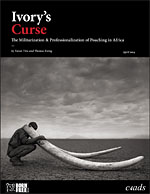Ivory’s curse: the militarization & professionalization of poaching in Africa
 Elephant ivory poaching is no longer solely a conservation issue. As poaching reaches levels that threaten to render African elephants near-totally extinct within the next ten years, it also funds a wide range of destabilizing actors across Africa, with significant implications for human conflict. A single elephant yields 10kg of ivory worth approximately $30,000; a conservative estimate is that 23,000 elephants were killed in 2013. With the true figure likely much higher, the ivory trade could be worth as much as a billion dollars annually, and will likely increase with the escalating retail price of ivory. This report provides detailed case studies of how these profits empower a wide range of African conflict actors: From Sudan, government-allied militias complicit in the Darfur genocide fund their operations by poaching elephants hundreds of miles outside North Sudan’s borders; In the Democratic Republic of Congo, state security forces patronize the very rebels they are supposed to fight, providing weapons and support in exchange for ivory; Zimbabwean political elites, including those under international sanction, are seizing wildlife spaces that either are, or likely will soon be, used as covers for poaching operations; In East Africa, al-Shabaab and Somali criminal networks are profiting off Kenyan elephants killed by poachers using weapons leaked from local security forces; Mozambican organized crime has militarized and consolidated to the extent it is willing to battle the South African army and well-trained ranger forces for rhino horn; In Gabon and the Republic of Congo, ill-regulated forest exploitation is bringing East Asian migrant laborers, and East Asian organized crime, into contact with Central Africa’s last elephants; In Tanzania, political elites have aided the industrial-scale depletion of East Africa’s largest elephant population.
Elephant ivory poaching is no longer solely a conservation issue. As poaching reaches levels that threaten to render African elephants near-totally extinct within the next ten years, it also funds a wide range of destabilizing actors across Africa, with significant implications for human conflict. A single elephant yields 10kg of ivory worth approximately $30,000; a conservative estimate is that 23,000 elephants were killed in 2013. With the true figure likely much higher, the ivory trade could be worth as much as a billion dollars annually, and will likely increase with the escalating retail price of ivory. This report provides detailed case studies of how these profits empower a wide range of African conflict actors: From Sudan, government-allied militias complicit in the Darfur genocide fund their operations by poaching elephants hundreds of miles outside North Sudan’s borders; In the Democratic Republic of Congo, state security forces patronize the very rebels they are supposed to fight, providing weapons and support in exchange for ivory; Zimbabwean political elites, including those under international sanction, are seizing wildlife spaces that either are, or likely will soon be, used as covers for poaching operations; In East Africa, al-Shabaab and Somali criminal networks are profiting off Kenyan elephants killed by poachers using weapons leaked from local security forces; Mozambican organized crime has militarized and consolidated to the extent it is willing to battle the South African army and well-trained ranger forces for rhino horn; In Gabon and the Republic of Congo, ill-regulated forest exploitation is bringing East Asian migrant laborers, and East Asian organized crime, into contact with Central Africa’s last elephants; In Tanzania, political elites have aided the industrial-scale depletion of East Africa’s largest elephant population.
